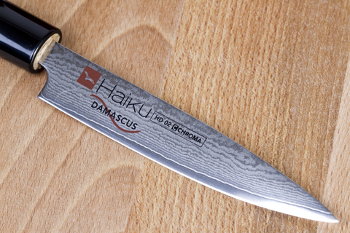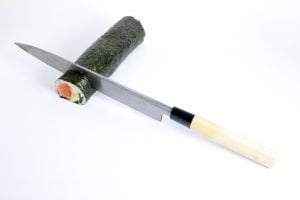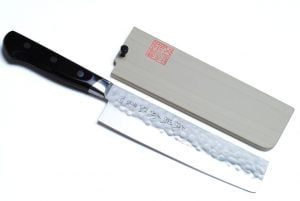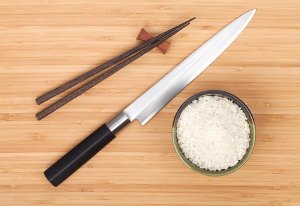Choosing and Care of Sushi Knives
By Grant Carter from
When it comes to choosing a set of sushi knives or one knife in particular, there are many choices out there! One may be interested in a knife for a sushi-making class or for a sushi party, or perhaps interested in becoming a professional sushi chef, or itamae. On either end of the spectrum, you will want to choose the knife or set of knives that feels good in your hand, is made of quality materials, and has the best warranty that you can find in a sushi knife manufacturer!

Of the many dozens of different types of traditional Japanese blades available for purchase these days, there are but three main styles that you will commonly find or need when making normal Maki and Nigiri-style sushi:
3 types of sushi knives
The Yanagi is a long knife with a thin, slender blade that is designed for precision slicing of sashimi. This knife is truly the itamae’s prized tool and the instrument responsible for the amazing presentation that you see in sushi-ya in Japan and the world over. While not all traditional Japanese cutleries are made in the same style as the traditional battle-sword of the samurai warrior, the katana, some are forged by hand in just the same technique.

The Deba is the utter workhorse of the Japanese kitchen, proving itself time and time again versus foe varying from sides of beef
to dismantling whole tuna. In Japan, each species of seafood has it’s own variation of knife specifically designed to work with it. For instance, an eel-knife has a special design that allows for quick dispatching of the eel and and a special blade to aid in quickly dismantling it. These blades range in all shapes and sizes, and some designed for working with whole tuna are up to six feet long!

The Usuba is a beautiful blade designed specially to work with vegetables and their presentation. An Usuba in properly skilled hands can turn mere vegetables into works of art! While it resembles a cleaver, it is completely different from the cleavers that Westerners think of!

Once you have chosen a knife or knife set, be sure to take proper care of these knives! Never put them in the dishwasher as the dish-washing detergents will decay the carbon in the steel! Another reason to never put your quality Japanese cutlery in the dishwasher or individually in a drawer are to prevent chipping, dulling, and rusting.
Remember that it is always a better value to take care of your quality knives than to replace your damaged ones!



Hello! Which knife is better for cutting sushi rolls?